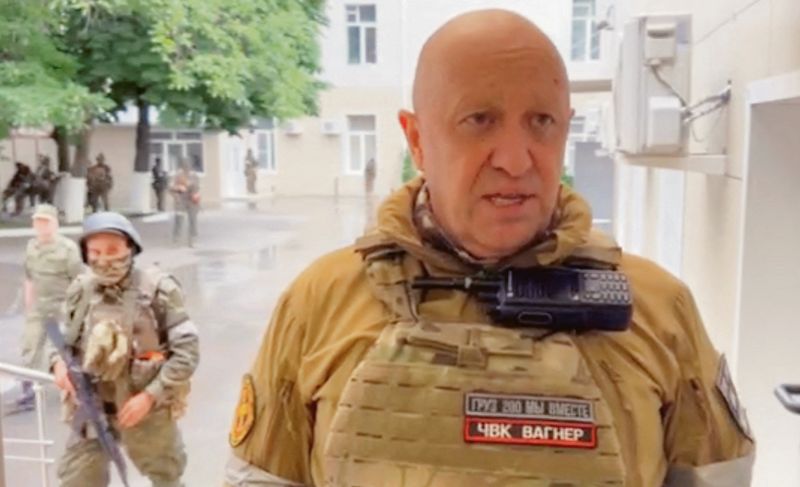Chinks in the Russian armour
- August 11, 2023
- Posted by: admin
- Categories: Russia, Ukraine

Wagner rebellion might prompt Moscow to make a reassessment of Ukraine war
Gurjit Singh
Former Ambassador
THE short-lived Wagner rebellion against Russia’s Ministry of Defence (MoD) reflects disharmony in Moscow. There is speculation about what caused and terminated the rebellion. Was it a series of miscalculations or a carefully orchestrated ploy? Was Wagner commander Yevgeny Prigozhin in league with Putin?
The inability of the Russian forces to clinch victory in Ukraine led to Wagner Group being recalled from several of its African operations.
The Wagner group is the force Moscow has used to achieve its goals through non-state actors. It is led by Prigozhin, a Russian oligarch, mercenary leader and well-connected caterer. It rose to prominence when Moscow wrested Crimea from Ukraine in 2014. That led to US sanctions on Wagner and Prigozhin.
Subsequently, the Wagner Group represented Russian interests in about 20 African countries. Its notable participation was in the unsuccessful quelling of the insurgency in the Cabo Delgado province of Mozambique, where, ultimately, Rwandan troops came to restore order. Wagner was active in Libya, Sudan, Mali and the Central African Republic, either replacing French forces or taking sides in internal conflicts. Its main role was to back those institutions which Russia supported and crush the opposition forces. In return, it received Russian arms and got concessions for the extraction of gold and other natural resources.
The Ukraine war and the inability of the Russian forces to clinch victory led to the Wagner Group being recalled from several of its African operations to participate in the war. Its performance in the Battle of Bakhmut was appreciated by Putin.
What forced Prigozhin to raise the banner of revolt? Some analysts say that he articulated the frustration that his soldiers felt by being denied supplies and ammunition during the Bakhmut campaign. Wagner suffered heavy casualties and possible loss of morale. Blaming it on the MoD was a good approach.
Prigozhin was also unhappy with Defence Minister Sergei Shoigu and the Chief of the General Staff, Gen Valery Gerasimov. They were keen on integrating Wagner into the regular forces and were insisting that Wagner soldiers should sign contracts with the ministry sooner than later. This meant that Wagner faced the prospect of being confined to its African operations once the Battle of Bakhmut was over.
That Prigozhin succeeded up to a point in taking a military stronghold in Rostov and then went public with his rebellion mean that things are not going well for Russia on the Ukraine front. Several voices within Russia are in favour of an MoD revamp.
The Federal Security Service (known as FSB, the successor to KGB) is reported to be more aligned with Prigozhin and, perhaps, not averse to a change in the top echelons of the MoD so that the ministry and the FSB can work in tandem rather than be competitors for power in Moscow.
The Wagner Group’s leadership is largely based in St Petersburg and can only play an influential role rather than control Moscow. Evidently, Wagner’s stated ambitions during the rebellion exceeded its capabilities and showed more of its frustration than strength.
How will the war progress from here on? Some factors need to be considered. If the campaign is going well, there would be no public rift among various players. The MoD was criticised loudly by Prigozhin and quietly by others.
Putin requires a victory in Ukraine ahead of the presidential election in March 2024. Already 16 Generals have been sacked or killed in the campaign. This is a high level of attrition at the General level. Will the Defence Minister and the Chief of the General Staff now fall victim to a reassessment of the war, based on the rebellion? Then, the rebellion’s limited objective may be achieved. Prigozhin probably misjudged that Putin would support Wagner. The group turned back from Moscow, which it had little chance of capturing.
Now, Moscow needs to look at the Ukraine campaign more closely, learning lessons from the Wagner rebellion. While such special forces have played a role in some Russian victories, they ultimately defeat the institutions of the state and, therefore, require better control. Can the regular army play a better role to attain Putin’s political objective in the next few months? This requires fully trained soldiers, better supplies and clearly attainable objectives. A change at the top in the MoD and the military will also require a change in strategy and tactics.
If it happens, will it ensure political harmony in Moscow? Putin needs coordination between the FSB and the MoD so that they fight collectively and not each other.
This unity is publicly missing and, therefore, it impacts the campaign on the ground. It is possible that a large number of Wagner cadres have not deserted and may accept MoD contracts because, ultimately, they are mercenaries and need to be paid regularly. Will they be as disciplined as the members of a regular army?
Prigozhin had his means of providing funds from African operations to Wagner and the MoD. He has accused the MoD of misusing these funds. With the African operations curtailed, Wagner having suffered casualties and Prigozhin facing an exile, the Wagner cadres would have to be dealt with in a different manner if they are to remain an effective force.
How to fit them in a wider Russian strategy to deal with Ukraine for positive results in the next eight months would be a critical factor.
Unlike Richard Wagner’s operas, the Wagner Group’s moves have caused cacophony. The Ukraine offensive continues and the Russian defence seems to be continuing too, but the tremors caused by Prigozhin may have exposed cracks in the Russian system.
